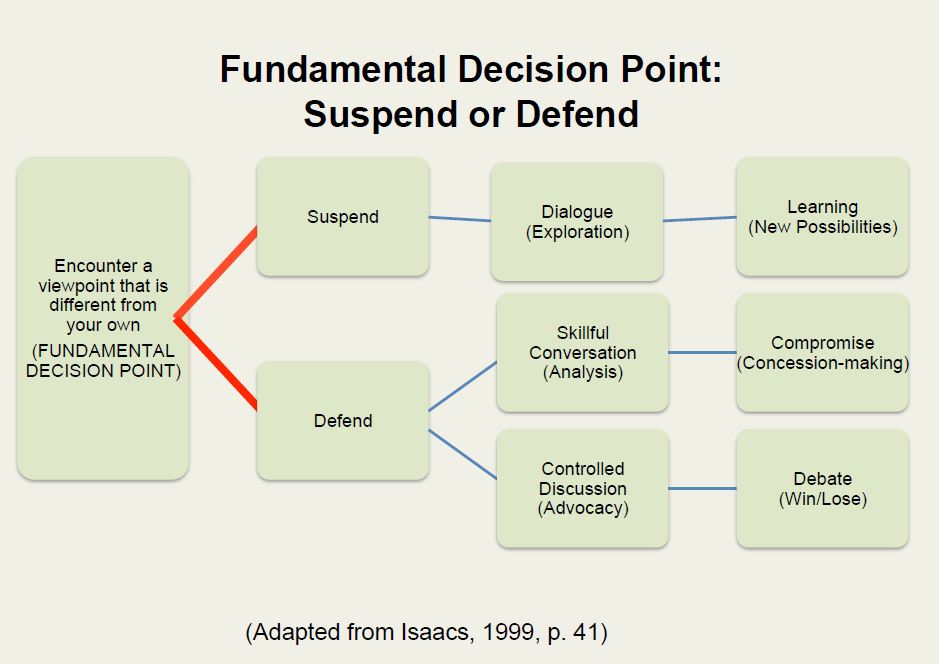This year I have the privilege of serving on the dissertation committee for Jen Mason, an engaging and highly competent graduate student conducting seminal research into “Mindfulness, Suspension and Learning in Multi-Stakeholder Groups” for her Ph.D. from Prescott College.
I am grateful for this opportunity to reconsider the importance of “suspension” in productive dialogue and collaboration. I first encountered this idea while participating in a series of International Women’s Dialogues through the Dialogue Project at MIT in the 1990’s. Through years of facilitating and teaching various approaches to group interactions, I have become convinced of the importance of suspending judgment in enabling people to understand one another and the components of any situation they are considering.
Since defending one’s point of view seems to be most people’s default reaction, suspending judgment requires making a conscious choice to step off the continuous train of thought and step back from familiar, even habitual opinions and judgments. Suspension also entails unearthing the assumptions and beliefs that underlie our opinions and judgments and holding them lightly, as if they were outside us and not us. In this way we make it more likely we can listen to and honestly consider points of view that differ from our own, learn from others, and discover ways forward. Being able to understand various points of view, even if we do not agree with them, gives us a more complete picture of any situation.
Although our opinions, judgments and positions might be obvious to us today, the seeds of the assumptions and beliefs underlying them were planted over a lifetime of experiences. Even if we don’t know what is shaping our current perspectives or positions, we can make a conscious choice to suspend them long enough to make space inside ourselves for exploring other ways of seeing a situation. (If you want to unearth your assumptions and beliefs, check The Power of Unexamined Beliefs or read Chapter 6: Opening to Change in Talk Matters!
Suspension is easier said than done. Because assumptions and beliefs get interwoven with our sense of who we are, when confronted with views that challenge them, we usually defend them. Self-protective maneuvers squelch listening, suffocate natural curiosity, and suppress creativity.
One approach to increasing our ability to suspend or set aside for the moment opinions, positions, beliefs, judgments, and assumptions is to practice mindfulness. Research indicates that practicing mindfulness decreases reactivity and therefore the need to defend ourselves and our ideas. It also increases our ability to notice reactions early enough so we can choose to suspend our judgments for a time instead of immediately defending them.
Suspending judgment is critical to understanding others and a situation as a whole, and working with others to find ways forward.
For more information about suspension, I recommend Dialogue: Rediscover the Transforming Power of Conversation by Linda Ellinor and Glenna Gerard, Dialogue and the Art of Thinking Together by David Isaacs, or On Dialogue by David Bohm.
Thanks to Jen Mason for the Fundamental Decision Point graphic.
Mary’s book “Talk Matters! Saving the World One Word at a Time” is now available. Click here to purchase it.


Really great article. I find these situations very common when facilitating. I also enjoyed the connection to mindfulness. Good job!